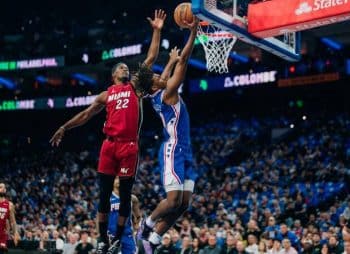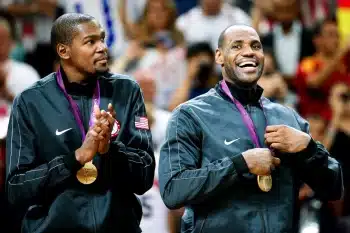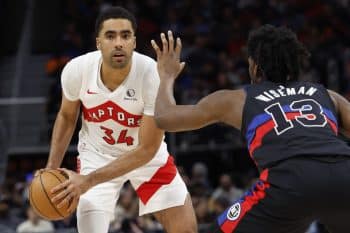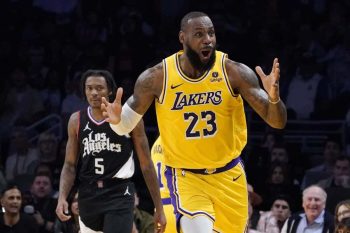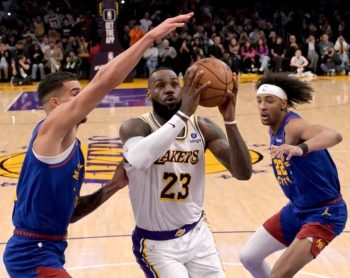NBA
NBA Sunday: Anthony Davis is No Guarantee

When you look back at some of the mighty legacies of players like Michael Jordan, Kobe Bryant, Reggie Miller, Charles Barkley and so on, you can see a common trend: they all had the ability to stay relatively healthy. Or, at the very least, they had the ability to stay healthy enough to stay on the court.
It’s funny how often we overlook one’s ability to stay healthy and withstand the grueling grind of playing 100 basketball games per year (including preseason and playoffs) as determinative of one’s legacy.
And now, unfortunately, it’s time to at least question whether or not Anthony Davis is built for it.
* * * * * *
Davis has been one of basketball’s most talked about players even prior to his entering the NBA. While he was still playing at Kentucky, legendary head coach Larry Brown compared him to Oscar Robertson and Bill Russell while Davis simply took the league by storm. It is no stretch of the imagination to say that, like Damian Lillard, Davis quickly proved to be a rare talent. Like Lillard, we were simply not accustomed to seeing a young player enter the league and be this good, this quickly.
We salivated, we bought in and we all, in hindsight, prematurely designated Davis as the heir apparent to LeBron James’ throne. Davis began the 2015-16 season with a Pelicans team that had just put together a 45-37 win season and got an introduction to playoff basketball. He entered the season with the second-best odds of winning the Most Valuable Player Award (second to LeBron James and ahead of Stephen Curry, who had the fourth-best odds), and with some mighty expectations.
Now, with news coming out that Davis has been playing with a partially torn labrum for three years and his undergoing a season-ending left knee procedure that will keep him sidelined for three-to-four months, maybe we will all learn a valuable lesson here: let’s not always be in a rush to anoint the next young prospect of being a franchise pillar.
Sure, we could easily recount the likes of Larry Johnson, Penny Hardaway and Grant Hill as past examples of players whose 
Remember: once upon a time, Derrick Rose was the best thing since sliced bread. Being named the youngest MVP in league history back in 2011, we all knew that he was destined for greatness and that it was only a matter of time before the Bulls were raising a seventh championship banner into the rafters at the United Center.
Things changed fairly quickly, didn’t they?
In the end, our lack of patience is a part of who we have become as a basketball culture. That causes us to boo Kristaps Porzingis when the New York Knicks draft him and declare D’Angelo Russell to be a bust before the All-Star break of his rookie year. Patience is a virtue, and as a basketball-viewing public, it’s something that we seem to have lost in the generation that is marked by multi-tasking and short attention spans.
With Rose, we had a player who was a new and improved version of an in-prime Stephon Marbury. But five years after seeing him at his peak, we are now merely hoping for—not expecting—a return to his former dominance.
With Curry and even Russell Westbrook to an extent, we had players who were thought to be damaged goods. As difficult as it is to imagine or remember at this point, fans and media alike were ready to throw the towel in on Curry and Westbrook’s ability to stay healthy. Quietly, though, Curry has missed just 13 games over the past four seasons while Westbrook has been arguably the most dominant player in the league since returning from playing only 46 games during the 2013-14 season.
The bottom line is that we simply don’t know how one’s story is going to end based on the cover of the book. Not knowing is okay. Watching intently and waiting is, as well. And at this point, that is what we all should collectively do with Anthony Davis.
* * * * * *
With his season now officially over, Davis will have failed to play in as many as 70 games in each of the first four years of his career. Having only recently celebrated his 23rd birthday, Davis has youth on his side and has already proven to be a tireless worker. Aside from the noticeable increase in his on-court productivity, Davis made national headlines this past summer when it was revealed that he was proactively addressing the size concerns that many had for him upon his entry into the league, as it was revealed that he had put on more than 12 pounds of muscle.
As a teammate and an individual, Davis has already proven to be a team-first player who sees the bigger picture and who is fully committed to building a winning culture in New Orleans. And at this point in time, in terms of the 25-year-old and under group of NBA talents, there’s Damian Lillard, Anthony Davis, Karl-Anthony Towns and everyone else.
Sure, Davis has the look and feel of a “surefire, can’t miss” talent, but if there is one thing you should have learned by following professional basketball, is that there is no such thing as a sure thing.
At this point, the smart money would be on Davis returning to basketball activity in three-to-four months and slowly and steadily rediscovering his form and his touch. As a franchise, the Pelicans can only hope that Alvin Gentry’s first season as the man in charge was an aberration and that they will have some luck in fortifying the team this summer.
But the most important thing to realize is that anointing any young player as the future of a franchise—much less as having a place amongst the greatest players in history—is a risky proposition.
One day, Anthony Davis might get there, but even if it has taken four years to get to this point, it’s time to acknowledge that—even for him—nothing is guaranteed.
